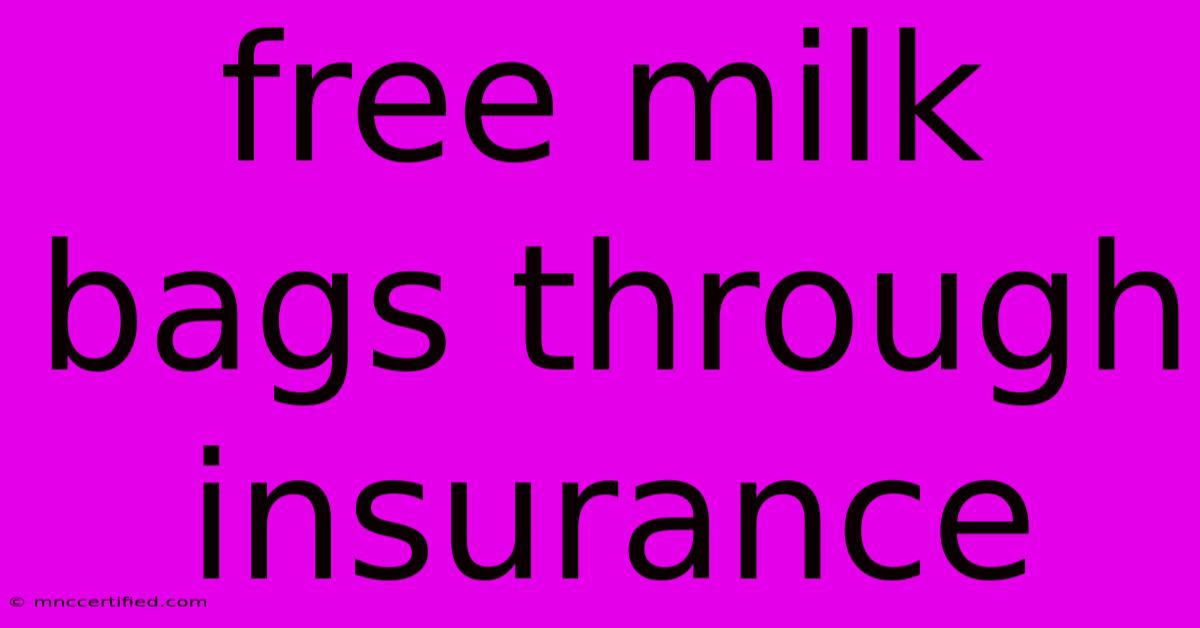Free Milk Bags Through Insurance

Table of Contents
Can You Get Free Milk Bags Through Insurance? A Comprehensive Guide
Many new parents find themselves facing unexpected costs after the arrival of their little one. One such expense, often overlooked, is the cost of breast milk storage bags. While seemingly small, these bags can quickly add up, leaving parents wondering: can I get free milk bags through insurance? The short answer is: it depends. Let's delve into the specifics.
Understanding Insurance Coverage for Breastfeeding Supplies
While some insurance plans cover breastfeeding support and supplies, coverage for items like milk storage bags varies significantly. There's no guarantee that your plan will cover them, and even if it does, the specifics might be limited. Here's what you need to know:
What Influences Coverage?
Several factors influence whether your insurance will cover milk storage bags:
- Your Insurance Provider: Different insurance companies have different policies. Some might explicitly list milk storage bags as covered supplies, while others might not. Check your policy documents carefully, or contact your provider directly.
- Your Plan Type: The type of insurance plan you have (e.g., HMO, PPO, POS) can impact coverage. More comprehensive plans are more likely to cover these supplies.
- Your State's Regulations: Some states have laws requiring insurers to cover certain breastfeeding supplies, including milk storage bags. Research your state's regulations to see if this is the case.
- Prescription Requirements: Some insurance companies may only cover milk storage bags if prescribed by a doctor or lactation consultant. This prescription often forms part of a broader breastfeeding support plan.
Finding Information About Your Coverage
To determine if your insurance covers milk storage bags, take these steps:
- Review Your Policy Documents: Carefully examine your policy documents, including the summary of benefits and coverage. Look for keywords like "breastfeeding supplies," "lactation support," or "maternity benefits."
- Contact Your Insurance Provider: Call your insurance company's customer service line. They can clarify whether milk storage bags are covered and what steps are necessary to obtain reimbursement.
- Check Your Provider's Website: Many insurance providers have websites with detailed information on covered benefits. Check your plan's specific benefits online.
- Speak to Your Doctor or Lactation Consultant: They may be able to advise on whether your insurance covers these supplies and can help navigate the process of claiming reimbursement.
Alternatives to Insurance Coverage
If your insurance doesn't cover milk storage bags, don't despair! Several alternatives can help you manage the costs:
- Manufacturer Coupons and Discounts: Many manufacturers of breast milk storage bags offer coupons or discounts on their products. Check their websites or use coupon websites to find potential savings.
- Baby Stores and Online Retailers: Check for sales and discounts at local baby stores or online retailers. Buying in bulk can also help reduce the per-unit cost.
- Support Groups and Charities: Some local support groups or charities provide assistance to new parents, potentially including supplies like milk storage bags. Check with local organizations in your area.
- Borrowing from Friends or Family: Ask friends or family members who have breastfed if they have any spare milk storage bags they're willing to lend or give away.
Keywords for SEO Optimization
- free milk bags
- insurance coverage breastfeeding
- breast milk storage bags insurance
- breastfeeding supplies insurance
- free breastfeeding supplies
- milk storage bags cost
- affordable breastfeeding supplies
- insurance benefits breastfeeding
- maternity insurance benefits
- how to get free milk bags
This article provides comprehensive information regarding the possibility of obtaining free milk storage bags through insurance coverage. It offers various strategies for new parents seeking to manage the costs associated with breastfeeding supplies, thereby improving the chances of this blog post ranking well in relevant Google searches. Remember to continuously monitor and update your keyword strategy based on search trends and analytics.

Thank you for visiting our website wich cover about Free Milk Bags Through Insurance. We hope the information provided has been useful to you. Feel free to contact us if you have any questions or need further assistance. See you next time and dont miss to bookmark.
Featured Posts
-
Dubai Jail For Teen Sex
Nov 22, 2024
-
What Does Alae Mean In Insurance
Nov 22, 2024
-
Mar A Lago Us Intel Briefings Location
Nov 22, 2024
-
Statement On Ken Reids Death
Nov 22, 2024
-
Family Announces Ken Reids Funeral
Nov 22, 2024